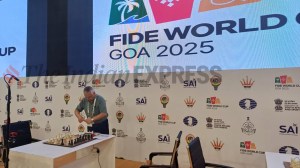PM regrets NAM fissures on terror
At the XIII NAM Summit, Prime Minister A.B. Vajpayee stuck to the main theme of revitalising the multi-lateral forum and suggested NAM shoul...

At the XIII NAM Summit, Prime Minister A.B. Vajpayee stuck to the main theme of revitalising the multi-lateral forum and suggested NAM should position itself as a ‘‘major pole’’ in a multi-polar configuration.
In his speech, Vajpayee tore apart the suggestion that there could be any confusion between terrorism and freedom struggle. ‘‘There can be no justification for terrorism. No political, ideological, religious or ethnic grounds can justify the shedding of blood of innocent people,’’ he said. The Prime Minister said the threat of global terrorism presents ‘‘our movement’’ with an immediate test of its commitment to its core principle.
Vajpayee regretted that even as terrorism continues, the international community could not conclude an international agreement— Comprehensive Convention on International Terrorism at UN—as there was no consensus on the universally accepted definition of terrorism.
Maintaining that the focus of the NAM summit was rivetted on Iraq, Vajpayee hoped for a peaceful resolution of the crisis and came out in support of the multi-lateral route of UN to address the issue. However, Vajpayee was more in tune with the facts of the Baghdad case and refused to be drawn into the NAM rhetoric over possible security manifestations of the Iraq war. He said : ‘‘Weapons of mass destruction need to be eliminated. It is essential that Iraq complies fully in implementing Security Council Resolution 1441.
Talking to reporters before addressing the summit, Vajpayee said that he was surprised how consensus was reached within NAM members over the Iraq issue. ‘‘With serious differences among the NAM members, the Iraq issue would turn out to be prickly,’’ Vajpayee said.
He suggested a five-pronged approach towards making the movement stronger and crucial in present day geo-politics. He said while multilateralism, combating global terrorism and reform of the UN should be NAM’s political agenda, its economic mandate should take into account developmental issues, democratisation of international financial institutions, North-South and South-South relations.
Vajpayee said NAM should concentrate on issues that unite, rather than divide members. ‘‘This principle is accepted in the practice of successful organisations such as the Organisation of Islamic Conference and ASEAN. NAM’s outlook and its agenda has to be global,’’ he said. On the economic note, he said South-South cooperation had to move from the political lectern to the marketplace. Vajpayee vouched for NAM adopting a progressive agenda on the fundamental values of democracy.





- 01
- 02
- 03
- 04
- 05

























